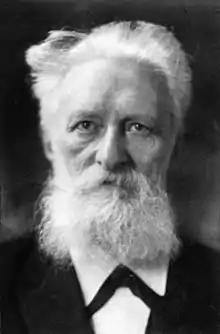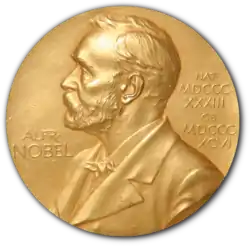Rudolf Christoph Eucken
Rudolf Christoph Eucken (German: [ˈɔʏkn̩]; 5 January 1846 – 15 September 1926) was a German philosopher. He received the 1908 Nobel Prize for Literature "in recognition of his earnest search for truth, his penetrating power of thought, his wide range of vision, and the warmth and strength in presentation with which in his numerous works he has vindicated and developed an idealistic philosophy of life", after he had been nominated by a member of the Swedish Academy.[3]
Rudolf Christoph Eucken | |
|---|---|
 | |
| Born | 5 January 1846 |
| Died | 15 September 1926 (aged 80) |
| Alma mater | Göttingen University Berlin University |
| Awards | Nobel Prize in Literature (1908) |
| Era | 19th-/20th-century philosophy |
| Region | Western philosophy |
| School | Continental philosophy German idealism |
| Institutions | University of Jena University of Basel |
Main interests | Ethics |
Notable ideas | Aktivismus (ethical activism)[1] The Real |
Influences
| |
| Signature | |
Early life
Eucken was born on 5 January 1846 in Aurich, then in the Kingdom of Hanover (now Lower Saxony). His father, Ammo Becker Eucken (1792–1851) died when he was a child, and he was brought up by his mother, Ida Maria (1814–1872, née Gittermann).[4] He was educated at Aurich, where one of his teachers was the classical philologist and philosopher Ludwig Wilhelm Maximilian Reuter (1803–1881).[5] He studied at Göttingen University (1863–66), where Hermann Lotze was one of his teachers, and Berlin University.[4] In the latter place, Friedrich Adolf Trendelenburg was a professor whose ethical tendencies and historical treatment of philosophy greatly attracted him.
Career
Eucken received his Ph.D. in classical philology and ancient history at Göttingen University in 1866 with a dissertation under the title De Aristotelis dicendi ratione.[6] However, the inclination of his mind was definitely towards the philosophical side of theology.[5] In 1871, after five years working as a school teacher at Husum, Berlin und Frankfurt, he was appointed Professor of Philosophy at the University of Basel, Switzerland, succeeding another of his former teachers at Göttingen, Gustav Teichmüller. He stayed there until 1874 when he took up a similar position at the University of Jena.[5] He stayed there until he retired in 1920. In 1912–13, Eucken spent half of the year as an exchange professor at Harvard University, and in 1913 he served as a Deem lecturer at New York University.[7][8] During World War I, Eucken, like many of his academic colleagues, took a strong line in favour of the causes with which his country had associated itself.[4][9]
.JPG.webp)
Ethical activism
Eucken's philosophical work is partly historical and partly constructive, the former side being predominant in his earlier, the latter in his later works. Their most striking feature is the close organic relationship between the two parts. The aim of the historical works is to show the necessary connexion between philosophical concepts and the age to which they belong; the same idea is at the root of his constructive speculation. All philosophy is philosophy of life, the development of a new culture, not mere intellectualism, but the application of a vital religious inspiration to the practical problems of society. This practical idealism Eucken described by the term "ethical activism."[1] In accordance with this principle, Eucken gave considerable attention to social and educational problems.[5]
He maintained that humans have souls, and that they are therefore at the junction between nature and spirit. He believed that people should overcome their non-spiritual nature by continuous efforts to achieve a spiritual life, another aspect of his ethical activism and meaning of life.
Later life and death
Rudolf Eucken married Irene Passow (1863–1941) in 1882 and had a daughter and two sons. His son Walter Eucken became a famous founder of ordoliberal thought in economics. His son Arnold Eucken was a chemist and physicist.[4]
Rudolf Eucken died on 15 September 1926 in Jena at the age of 80.[4]
Major works
He was a prolific writer; his best-known works are:
- Die Lebensanschauungen der großen Denker (1890; 7th ed., 1907; 1918; Eng. trans., W. Hough and Boyce Gibson, The Problem of Human Life, 1909) (The Problem of Human Life as Viewed by the Great Thinkers)
- Der Kampf um einen geistigen Lebensinhalt (1896) (The Struggle for a Spiritual Content of Life)
- Der Wahrheitsgehalt der Religion (1901) (The Truth of Religion)
- Grundlinien einer neuen Lebensanschauung (1907) (Life's Basis and Life's Ideal: The Fundamentals of a New Philosophy of Life)
- Der Sinn und Wert des Lebens (1908) (The Meaning and Value of Life)
- Geistige Strömungen der Gegenwart (1908; first appeared in 1878 as Die Grundbegriffe der Gegenwart; Eng. trans. by M. Stuart Phelps, New York, 1880) (Main Currents of Modern Thought)
- Können wir noch Christen sein? (1911) (Can We Still Be Christians?, 1914)
- Present Day Ethics in their Relation to the Spiritual Life (1913) (Deem Lectures given at New York University)
- Der Sozialismus und seine Lebensgestaltung (1920) (Socialism: an Analysis (1922))
Other notable works are:
- Die Methode der aristotelischen Forschung (1872) (The Aristotelian Method of Research)
- Geschichte der philosophische Terminologie (1879) (History of Philosophical Terminology)
- Prolegomena zu Forschungen über die Einheit des Geisteslebens (1885) (Prolegomena to Research on the Unity of the Spiritual Life)
- Beiträge zur Geschichte der neueren Philosophie (1886, 1905) (Contributions to the History of the Newer Philosophies)
- Die Einheit des Geisteslebens (1888) (The Unity of the Spiritual Life)
- Thomas von Aquino und Kant (1901) (Thomas Aquinas and Kant)
- Gesammelte Aufsätze zu Philosophische und Lebensanschauung (1903) (Collected Essays on Views of Philosophy and Life)
- Philosophie der Geschichte (1907) (Philosophy of History)
- Einführung in die Philosophie der Geisteslebens (1908; Eng. trans., The Life of the Spirit, F. L. Pogson, 1909, Crown Theological Library) (Introduction to the Philosophy of the Life of the Spirit)
- Hauptprobleme der Religionsphilosophie der Gegenwart (1907) (Main Problems of the Current Philosophy of Religion)
Other English translations of his work include:
- Liberty in Teaching in the German Universities (1897)
- Are the Germans still a Nation of Thinkers? (1898)
- Progress of Philosophy in the 19th Century (1899)
- The Finnish Question (1899)
- The Present Status of Religion in Germany (1901)
- The Problem of Human Life as Viewed by the Great Thinkers from Plato to the Present Time, Charles Scribner's Sons, 1909.
- Back to Religion, 1912.
- Main Currents of Modern Thought: A Study of the Spiritual and Intellectual Movements of the Present Day, T. Fisher Unwin, 1912.
- The Meaning and Value of Life, A. and C. Black, 1913.
- Can we Still be Christians?, The Macmillan Company, 1914.
- Collected Essays, T. Fisher Unwin, 1914.
- Knowledge and Life (translation), G.P. Putnam's Sons, 1914.
He delivered lectures in England in 1911 and spent six months lecturing at Harvard University and elsewhere in the United States in 1912–1913.
References
- W. R. Boyce Gibson, Rudolf Eucken's Philosophy of Life, Kessinger Publishing, 2004, p. 170.
- Kierkegaard Research: Sources, Reception and Resources, Volume 8, Tome III, Ashgate Publishing, Ltd., 2009, p. 177.
- nobelprize.org
- "Biografie Rudolf Christoph Eucken (German)". Bayerische Nationalbibliothek. Retrieved 5 August 2015.
-
 One or more of the preceding sentences incorporates text from a publication now in the public domain: Chisholm, Hugh, ed. (1911). "Eucken, Rudolf Christoph". Encyclopædia Britannica. 9 (11th ed.). Cambridge University Press. p. 878.
One or more of the preceding sentences incorporates text from a publication now in the public domain: Chisholm, Hugh, ed. (1911). "Eucken, Rudolf Christoph". Encyclopædia Britannica. 9 (11th ed.). Cambridge University Press. p. 878. - The dissertation is available online at Internet Archive.
- University, Harvard (1912). Harvard University Catalogue. The University.
- "Rudolf Eucken - Biographical". www.nobelprize.org. Retrieved 2018-03-14.
- Chisholm, Hugh, ed. (1922). . Encyclopædia Britannica (12th ed.). London & New York: The Encyclopædia Britannica Company.
Further reading
- Beck, Friedrich Alfred. Rudolf Eucken, Deutsche Buch-Gemeinschaft, 1927.
- Booth, Meyrick. Rudolf Eucken: His Philosophy and Influence, Charles Scribner's Sons, 1913.
- Feuling, Daniel. "Rudolf Eucken's Philosophy," The Dublin Review, Vol. CLV, July/October, 1914.
- Gibson, W. R. Boyce. Rudolf Eucken's Philosophy of Life, A. & C. Black, 1915.
- Jones, Abel J. Rudolf Eucken: A Philosophy of Life, T. C. & E. C. Jack, 1913.
- Jones, W. Tudor. Rudolf Eucken: His Life and Philosophy, Haldeman-Julius Co., 1920.
- MacSwiney, Margaret Mary. Rudolf Eucken and the Spiritual Life, National Capital Press, 1915.
External links
 Media related to Rudolf Eucken at Wikimedia Commons
Media related to Rudolf Eucken at Wikimedia Commons- Eucken, Rudolf Christoph at Nobel-winners.com
- Works by Rudolf Eucken at Project Gutenberg
- List of Works
- Works by or about Rudolf Christoph Eucken at Internet Archive
- Works by Rudolf Christoph Eucken at LibriVox (public domain audiobooks)


- Newspaper clippings about Rudolf Christoph Eucken in the 20th Century Press Archives of the ZBW

- Rudolf Christoph Eucken on Nobelprize.org

